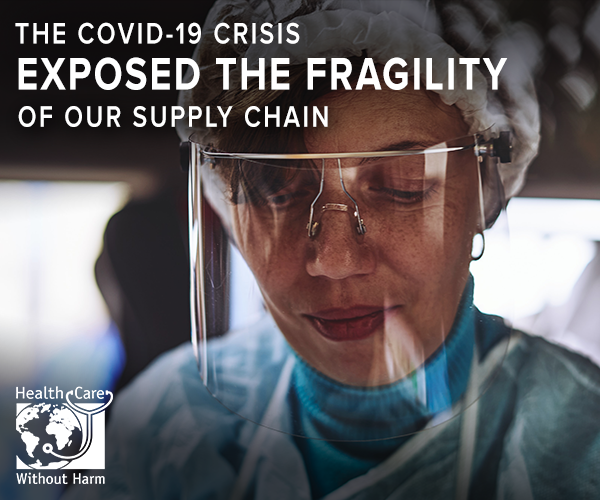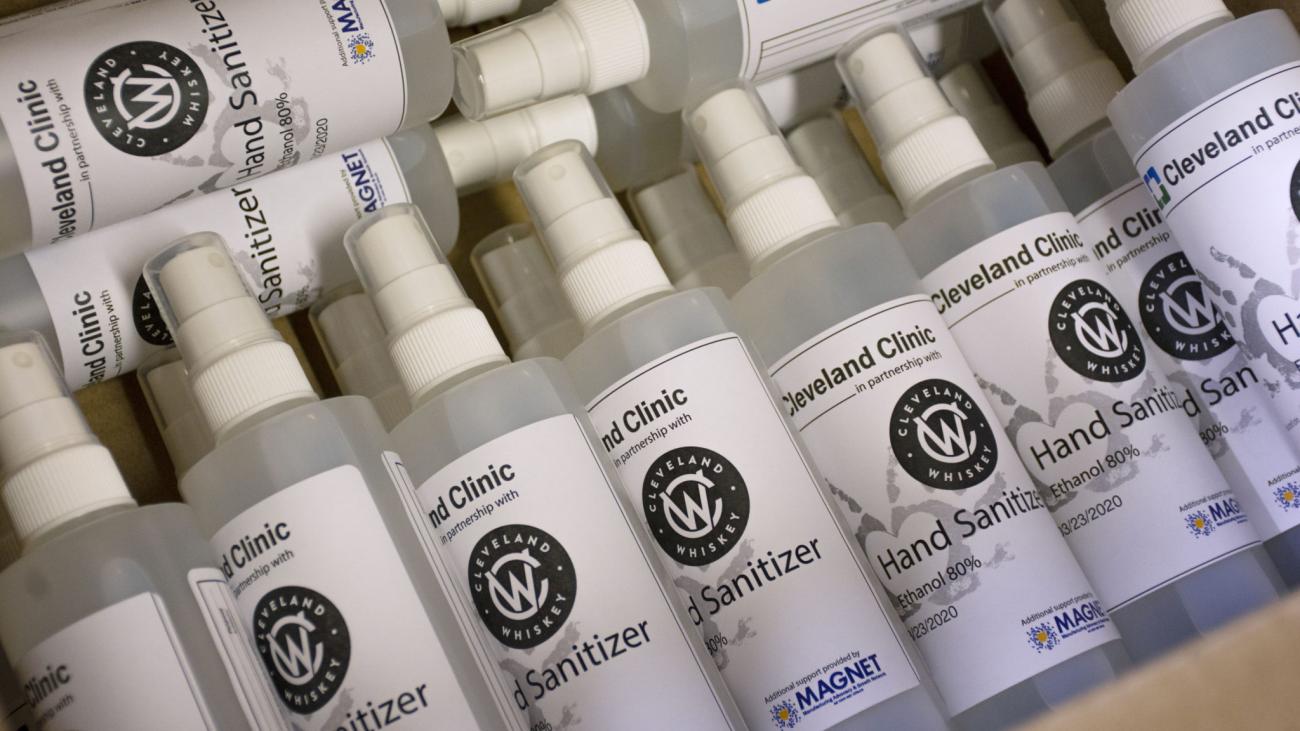Here's what health care is doing about it
When the COVID-19 pandemic reached its first peak in the United States this spring, we saw just how unprepared the nation was to face such a crisis. States began to bid against one another and the federal government for medical supplies, driving up prices and slowing down deliveries. Hospitals were forced to find ways to reuse and conserve PPE. The nation also experienced a shortage of disinfectant cleaners, a critical component of preventing the spread of the virus both inside and outside a hospital’s walls.
As the country currently faces its worst COVID-19 numbers yet, the U.S. medical supply chain will continue to face challenges while many people on the front lines remain vulnerable. More than 120,000 health care workers have been infected and almost 600 have died from COVID-19.
Sustainability and resilience are intrinsically linked in preparing for and responding to the unforeseen challenges COVID-19 and climate change will continue to bring.
Health care sustainability leaders will need to respond to these challenges by planning for unforeseen disasters, evaluating alternative options, and building in supply chain resilience.
In response to the pandemic, these leaders sought sustainable and cost-efficient ways to stop the spread of COVID-19. Health Care Without Harm’s Health Care Climate Council member, Cleveland Clinic, partnered with a local distillery to formulate, blend, and bottle hand sanitizer for the health system. Practice Greenhealth partner, University of Florida Health, developed prototypes of face masks made from plentiful sterilization wrap that would otherwise be thrown out.
The hand sanitizer bottles are being distributed to Cleveland Clinic’s main campus and 11 regional hospitals in Ohio. (Courtesy: Cleveland Whiskey)
Hospitals and communities already regularly face climate-related crises. More than 70% of health care’s greenhouse gas emissions are derived from the supply chain: the production, transport, and disposal of goods and services. As health care systems continue to be overstretched by the pandemic, operating margins continue to become thinner, and we are confronted with new disasters brought on by climate change. Sustainable procurement can shape the marketplace, create pressure for sustainable products, and embrace localized, equitable, and resilient economies.
Health Care Without Harm is launching several innovative initiatives that are imperative to move health care toward local, equitable supply chains that reduce environmental and public harm while providing economic growth in communities around the country.
These initiatives represent the next step in Health Care Without Harm’s two-decade long journey developing environmentally preferable criteria within health care.
Charting the course: A new guide for sustainable procurement
Developed over two years with support from the United Nations Development Programme and Swedish International Development Cooperation Agency, our new guide for sustainable procurement is the first of its kind. Featuring stories and insights from 25 health care organizations around the world, the guide provides step-by-step guidance and tools for hospitals to serve as a roadmap for both new and existing programs.
Setting the standard: The Greenhealth Approved seal
Greenhealth Approved allows health care purchasers to easily identify sustainable alternatives to products they currently purchase. The Greenhealth Approved seal leverages the industry-recognized criteria developed by Health Care Without Harm and the aggregate demand of health care, which will continue to accelerate the development of environmentally preferred products.
Building on Health Care Without Harm and Practice Greenhealth’s long-standing efforts to transform the health care marketplace, the seal enables suppliers to submit products for review against our criteria and, upon approval, to display the seal.
Partnering with suppliers
Practice Greenhealth is launching an affiliate partner program, which provides manufacturers, suppliers, service providers, and other supply chain partners to collaborate with the Practice Greenhealth community. We provide opportunities for organizations to access more in-depth information and resources, participate in higher-level opportunities, and obtain greater visibility in the health care sustainability space and the Practice Greenhealth network to meet their professional and business objectives.
Aligning priorities and committing to impact
Healthcare Anchor Network: Caring for Our Communities from Democracy Collaborative on Vimeo.
In collaboration with the Democracy Collaborative and the Healthcare Anchor Network, Practice Greenhealth is designing an impact purchasing commitment framework with goals in supplier diversity, sustainability, and community wealth – building goals to institutionalize social impact within supply chain practices and decisions. It will drive changes to internal policy and practices (or formally codify them), shifting purchasing toward strengthening local economies and building wealth for low-income residents and communities of color.
Anchors in resilient communities
Anchors in Resilient Communities (ARC) are community-based partnerships that leverage the purchasing and investment power of anchor institutions to bolster the communities they serve. The concept for ARC was born in 2013, and is a multi-sector collaborative model developed in the East Bay in Northern California by Health Care Without Harm and Emerald Cities Collaborative. The ARC model operates on the belief that the collective power of community leaders and institutions can design equitable and local economies that work for everyone.
"We have the chance to heal from an immoral economic logic that has made both the planet and people expendable." - Gary Cohen, Health Care Without Harm founder
COVID-19 exposed the fragility of our global supply chains, but it also presented us with an opportunity. Together, through these initiatives, we are building a supply chain that is able to withstand the shocks and stressors brought on by climate change and now COVID-19. This supply chain will foster a resilient, sustainable health care model that prioritizes community and environmental health and safety, and can weather the storm when the next crisis hits.


